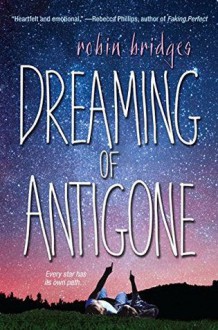
Thanks to NetGalley and to Bloomsbury Publishing for providing me with an ARC of this novel that I freely chose to review.
When I read in the description of this novel that it was a contemporary version of Antigone, I was intrigued. If all Greek tragedies are powerful stories, I’ve always been inclined towards those that figure female characters at their centre, and by the moral questions they pose. The author explains, in a note at the end, that the project had started as a suggestion to write a modern adaption of the play for the stage but it had ended up as a novel. Her choices on adapting the original material make it, in my opinion, very apt to the current times, whilst at the same time preserving the eternal nature of its moral and ethical questions.
I don’t think I can improve on the description of the novel that I’ve shared above, but I thought I’d offer a few more details. The story, told in the third person, is divided into five parts, each one narrated by one of the main characters of the story. First, we have Isma Pasha, the oldest sister of a Pakistani-British family. When her mother died, she sacrificed herself for her twin sibling and left her studies to support them until they were old enough to choose their own paths. She is serious, studious, hard-working, and remembers a bit more than her siblings do what it was like when her father, a Jihadist who was never home, died on his way to Guantanamo Bay. The questions, the surveillance, the suspicions, the need to be ‘beyond reproof’… When her sister Aneeka, is about to start university, and her brother, Parvaiz, is pursuing a career in sound and media studies, she accepts an offer by one of her old professors to continue her studies at Amherst College in Massachusetts. She enjoys her quiet life there and meets a young man, Eamonn, whom she recognises as the son of an important UK politician, and one that had had some dealings with her family in the past. Although from very different social classes they share some things in common (they are both from London and they have Pakistani family, although Eamonn knows very little about that side of things). Their friendship never develops into anything deeper, but it brings hope and possibility to Isma’s life.
The next part is told by Eamonn, who intrigued by a photo he’d seen of Isma’ sister, tracks her down, and despite the secrecy surrounding their relationship, falls for her.
Parvaiz’s story is that of a young man brought up among women, who is very close to his twin-sister, Aneeka, but annoyed because the women in his life make decisions without him and he has no male role-model to guide him. A chance meeting with a man who tells him he knew his father ends up in his indoctrination and eventual joining of the Caliphate.
Aneeka’s chapters talk about her grief and her determination to do what she thinks is right, no matter the price or the consequences, both to herself and to those around her. When is love too much and how far would you go for your family?
Karamat Lone, the British Home Secretary, has the two final chapters. He is of Pakistani origin but has abandoned much of his culture and identity (including his religion and his way of life) and advocates assimilation and harsh punishment for those who don’t. Like for Aneeka, for him, there can be no compromise. He repeatedly chooses politics and his official life over his family and that has terrible consequences.
Shamsie has created multi-faceted characters, all distinctive and different in the way they feel, they see the world, and they relate to others. I found Parvaiz’s story particularly effective and touching, particularly as his decision might be the most difficult to understand for many readers. He loves sounds and the way he describes everything he hears is fascinating. The story of his indoctrination and the way he ends up trapped in a situation with no way out is hard to read but totally understandable. They choose him because he is a young man, vulnerable, looking for a father figure, and easy to manipulate. He makes a terrible mistake, but like the rest of the characters, he is neither totally good nor bad. They all keep secrets, in some cases to avoid others getting hurt, in others to try and save somebody or something. At times questions are not asked so as not to shatter an illusion, and at others, even the characters themselves no longer know what the truth is. The structure of the novel allows us to see the characters from their own perspective but they also appear in the stories of the others, and that gives us a better understanding of who they really are, how they appear to the rest of the people, and of the lies they tell themselves and others.
The novel deals with a number of relevant subjects, like terrorism and counter-terrorist measures, religion, ethnic and religious profiling, social media, surveillance and state-control, popular opinion and its manipulation by the media, politics, identity, family, love (many different kinds of love), ethics and morality. Although many of these topics are always at the centre of scholarly and popular debates, now they are more pressing than ever.
This is a beautiful book, lyrical at times, full of warmth and love (family love, romantic love, love for knowledge and tradition…), but also of fear and hatred. It is passionate and raw. We might not agree with the actions and opinions of some (or even all) the characters, but at a certain level, we get to understand them. We have fathers (and most of the men, although not Eamonn) prepared to sacrifice their families and their feelings for what they think is a higher and mightier good (country, religion, politics…). We have women trying to maintain the family ties and do what is right beyond creed, country lines, written laws, and paperwork. And a clash of two versions of family, identity, and survival condemned to never reaching an agreement.
I highlighted many lines of the text (and although always in the third person, the language and the expressions of the characters are very different in each segment), and some are very long (another writer not concerned about run-on sentences at times, although they serve very clear purposes), but I decided to share just a few examples:
Always these other Londons in London.
He was nearing a mosque and crossed the street to avoid it, then crossed back so as not to be seen as trying to avoid a mosque. (This is Eamonn walking around London).
She was the portrait to his father’s Dorian Gray —all the anxiety you’d expect him to feel was manifest in her. (Eamonn thinking about his mother).
Grief was what you owed the dead for the necessary crime of living on without them. (Aneeka thinking about her brother and about grief).
This was not grief. It was rage. It was his rage, the boy who allowed himself every emotion but rage, so it was the unfamiliar part of him, that was all he was allowing her now, it was all she had left of him. She held it to her breast, she fed it, she stroked its mane, she whispered love to it under the starless sky, and sharpened her teeth on its gleaming claws.
The human-rights campaign group Liberty issued a statement to say: ‘Removing the right to have rights is a new low. Washing our hands of potential terrorists is dangerously short-sighted and statelessness is a tool of despots, not of democrats.’
He looked like opportunity tasted like hope felt like love (Anika about Eamonn).
Working class or Millionaire, Muslim or Ex-Muslim, Proud-Son-of-Migrants or anti-Migrant, Moderniser or Traditionalist? Will the real Karamat Lone please stand up? (The newspapers talking about Karamat Lone, the Home Secretary).
Who would keep vigil over his dead body, who would hold his hand in his final moments? (Karamat thinking about his mother’s death and then his own).
This is a powerful book and a novel that made me see things from a different perspective. What happens to those left behind? We are used to hearing about the families of young men and women who leave them and their country of birth to join terrorist groups. We hear of their surprise at what has happened, they seem unable to react or understand how their son, daughter, sister, brother… has become somebody they no longer understand or know. But, what must life be like for them afterwards?
There are elements that might stretch the imagination but for me, they fit within the scope of the story (it is supposed to be a tragedy, after all) and the novel treads carefully between realism and dramatic effect.
A great novel that brings to life many issues that are sometimes ignored in the political and media discourses but that are fundamental if we want to reach a better understanding of the situation. A book for people who are looking for something more than a good story and a bit of entertainment, and are prepared to ask themselves some questions. Another author I had not read yet but whom I will eagerly follow from now on.

 Log in with Facebook
Log in with Facebook 









